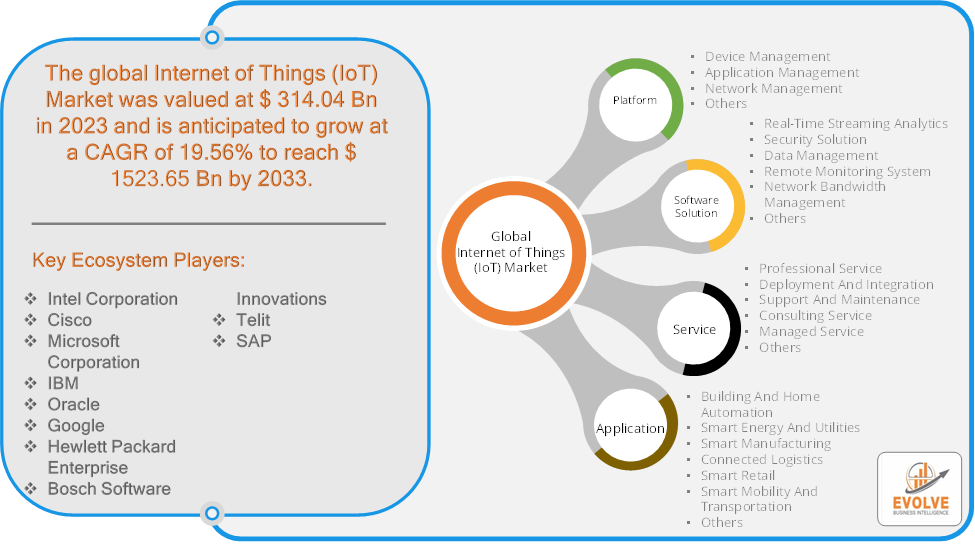IoT Market Surges: 19.56% CAGR Predicted

Evolve Business Intelligence has published a research report on the Global Internet of Things (IoT) Market, 2023–2033. The global Internet of Things (IoT) Market is projected to exhibit a CAGR of around 19.56% during the forecast period of 2023 to 2033.
Evolve Business Intelligence has recognized the following companies as the key players in the global Internet of Things (IoT) Market: Intel Corporation, Cisco, Microsoft Corporation, IBM, Oracle, Google, Hewlett Packard Enterprise, Bosch Software Innovations, Telit and SAP.
 More Information: https://evolvebi.com/report/internet-of-things-iot-market-analysis/
More Information: https://evolvebi.com/report/internet-of-things-iot-market-analysis/
Market Highlights
The Global Internet of Things (IoT) Market is projected to be valued at USD 1523.65 Billion by 2033, recording a CAGR of around 19.56% during the forecast period. The Internet of Things (IoT) Market refers to the global market for products, services, and technologies that enable devices to connect and communicate with each other over the internet. This market encompasses a wide range of sectors, including consumer electronics, healthcare, industrial automation, smart cities, agriculture, and transportation.
The IoT Market is driven by factors such as the increasing adoption of smart devices, advancements in connectivity technologies, the growing need for automation and efficiency, and the expansion of smart city initiatives.
The COVID-19 pandemic had a significant impact on the Internet of Things (IoT) Market. The pandemic accelerated the adoption of IoT technologies as businesses and organizations sought to enhance remote monitoring, automation, and efficiency. This shift was particularly notable in sectors like healthcare, manufacturing, and logistics. There was a surge in the demand for IoT solutions in healthcare, including remote patient monitoring, telemedicine, and wearable health devices. These solutions helped manage patient care, reduce hospital visits, and monitor vital signs remotely. With social distancing and remote work becoming more prevalent, there was increased interest in smart city solutions. IoT technologies were used to improve urban management, enhance public safety, and optimize resource usage. As remote work became more common, there was a greater need for IoT solutions that support remote monitoring and management of office environments, including smart office systems and remote collaboration tools. The increased use of IoT devices and remote connectivity raised concerns about cybersecurity and data privacy. Organizations had to invest more in securing their IoT networks and addressing potential vulnerabilities.
Segmental Analysis
The global Internet of Things (IoT) Market has been segmented based on Platform, Software Solution, Service and Application.
Based on Platform, the Internet of Things (IoT) Market is segmented into Device Management, Application Management, Network Management and Others. The Device Management segment is anticipated to dominate the market.
Based on Software Solution, the global Internet of Things (IoT) Market has been divided into the Real-Time Streaming Analytics, Security Solution, Data Management, Remote Monitoring System, Network Bandwidth Management and Others. The Real-Time Streaming Analytics segment is anticipated to dominate the market.
Based on Service, the global Internet of Things (IoT) Market has been divided into the Professional Service, Deployment And Integration, Support And Maintenance, Consulting Service, Managed Service and Others. The Professional Service segment is anticipated to dominate the market.
Based on Application, the global Internet of Things (IoT) Market has been divided into the Building And Home Automation, Smart Energy And Utilities, Smart Manufacturing, Connected Logistics, Smart Retail, Smart Mobility, And Transportation and Others. The Smart Energy And Utilities segment is anticipated to dominate the market.
More Information: https://evolvebi.com/report/internet-of-things-iot-market-analysis/
Regional Analysis
The Internet of Things (IoT) Market is divided into five regions: North America, Europe, Asia-Pacific, South America, and the Middle East, & Africa. North America is currently the dominant region in the IoT market, driven by early adoption of technology, robust infrastructure, and a strong focus on innovation. Smart homes, connected cars, industrial IoT, and healthcare IoT are major growth areas and data privacy and security concerns are significant hurdles. Europe has a strong industrial base, leading to significant investments in industrial IoT applications. The region has stringent data privacy laws (GDPR) influencing IoT development and adoption. Asia-Pacific is the fastest-growing region due to increasing digitalization, a large population, and government support. China is a major player in IoT manufacturing and is rapidly expanding its IoT ecosystem and the region is witnessing growth in smart cities, agriculture, and consumer IoT. The MEA region is in the early stages of IoT adoption, with significant growth potential. Governments in the region are investing in smart city initiatives to improve infrastructure and quality of life. Latin America is showing increasing interest in IoT, driven by urbanization and economic growth. Growing demand for smart infrastructure, increased investment in technology, and the need for improved resource management.
